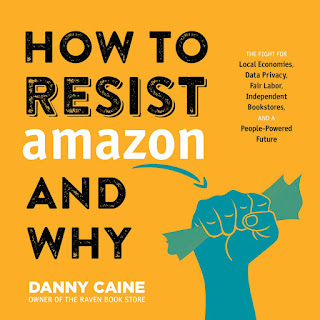Danny Caine runs an independent, employee-owned bookstore, Raven Book Store, in Lawrence, Kansas. He's also an active small business advocate, and makes an excellent case that Amazon is destructive of small businesses, local economies, and fair business regulation and practices.
Caine examines the ways that Amazon, as the owner of the platform many small businesses sell on, as well as a direct competitor to those business, able to set the rules that everyone on the platform competes under, is able to exploit information businesses wouldn't share with any other competitor, and can rig the rules. Once a business comes to depend on Amazon sales, getting banned by Amazon can be a death sentence, and there's really no appeal process. Amazon, in such instances, is judge, jury, and executioner.
There's also the matter of worker safety, and worker pay. Amazon brags about its $15 an hour minimum starting pay, but that's for actual Amazon employees. Same with safety practices. The actual Amazon warehouses tend to have a pretty good record overall. But many people who appear to be in every way Amazon employees are in fact third party contractors, and they don't get the guaranteed minimum $15 an hour. Amazon also sets performance standards that are essentially unmeetable, and that creates pressure to value speed over safety.
Many of the "Amazon delivery vans" that we see daily are in fact owned by third party companies, small companies founded to meet the Amazon demand for delivery trucks and personnel, and aren't covered by Amazon's corporate minimum wage, or any other Amazon policies covering employees. And these are the majority of the people delivering your Amazon packages, in trucks marked with the Amazon logo, and wearing Amazon shirts and hats. If there's an accident, and someone is injured or killed (this has happened, and hit the news sometimes), you're not going to be suing a huge company with very deep pockets, who can afford to pay large damages. You're far more likely to be suing a tiny local company that is more likely to go bankrupt.
Since most of these companies exist only to deliver Amazon packages, this seems like a cheat.
Caine has a lot more to say. What he isn't saying, and I'm not saying (and not doing, either), is to boycott Amazon. Generally, it's difficult to impossible. If I need something heavy, such as the new air conditioner I recently bought, or the rollator I'm considering now after my knee recently gave way under me, I'm going to need it delivered, and often Amazon is the only retailer that will deliver. It provides the backbone of many other commercial websites--including Danny Caine's own Raven Book Store. I do my best to get as many as possible of my audiobooks from sources other than (Amazon-owned) Audible, such as Libro.fm, which lets you support your preferred local bookstore with your audiobook purchases, or
Audiobooks.com, which at least isn't Amazon. For print books, there's Bookshop.org, which also lets you support your local bookstore, when you want something they don't have on the shelf. (Although I have a bit of conceptual problem with this one. If I want a print book, and it has to be ordered anyway, I'm going to order it directly from my favorite bookstore, Gibson's Bookstore.) There are alternatives for ebooks, too, though sadly I've found nothing that's really a substitute for Amazon, there.
But my point is, without committing to a full boycott of Amazon, which can be very hard, you can start shifting some of your business elsewhere, and supporting your local businesses, which keeps the money circulating locally and supporting the local economy--and businesses bound by regulations that Amazon often avoids being subject to. You don't have to be a purist on this to start doing a little bit of local good.
Caine has a lot more to say, and he tells it more interestingly than I do.
It won't surprise you to know that this book isn't available on Amazon. I got the audiobook on Libro.fm, and it's available in print at Bookshop.org.

No comments:
Post a Comment